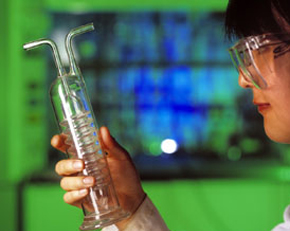Food Chemistry Degree
Making discoveries on the chemical structure of food and how to improve their qualities are the main aims of professionals in food chemistry. Food chemistry uses chemistry to perform actions like packaging, manufacturing, preserving, storing and distributing food items. These activities are done in a way that guarantees hygiene and appetite when the food gets to the consumer.
Students who enroll for a degree program in food chemistry do not only study chemistry. Other fields they study include biology, biochemistry, physics, engineering, nutrition and microbiology. A student in food chemistry department aims at working in places where he can prepare very nutritious foods and beverages that taste better. Some of the steps he takes in doing this include analyzing heat processing methods, studying the effects of different processing methods on food and discovering the factors that can change the taste, appearance, nutrition, smell and freshness of food items. Food chemists also work with the Food and Drug Administration where they test foods and beverages before they are approved for human consumption.
Courses to do in a Food Chemistry Degree Program
Students offering food chemistry also offer some of the courses taken in chemistry degree programs. Courses that are common in both fields include:
- General chemistry
- Analytical chemistry
- Organic chemistry Inorganic chemistry
- Biochemistry and
- Physical chemistry
Food chemistry students are introduced to courses that will make them understand the fundamentals of food chemistry so that they will perform better when they start taking advanced courses. Some of the courses that provide the overview of food chemistry include:
- Food processing methods
- Principle of food science
- Food analysis
- Food chemistry (with lab experience)
- Food microbiology (and lab experience)
- Human nutrition
- Food product development and
- Food Assessment
Specializations in Food Chemistry Degree
Culinary Science- Students in culinary science are exposed to both science and art based subjects. The science subjects are included to prepare the students for a degree in food chemistry. A culinary science degree can be obtained after a two-year study. Culinary science degree can be obtained in some of the schools where food chemistry degree programs are taken.
Food Safety- This course prepares students to work in industries where research and development in technology are required. Students who want to specialize in this field should ensure that the school they intend to attend is accredited by the Institute of food Technologists.
Salary structure for students studying food chemistry
From the facts presented by the United States of Labor Statistics in 2008, the median salary of chemists was around $66,230 per year. Fresh graduates usually found jobs that offered them salaries greater than others in the arts discipline. The highest income earners were located in federal establishments and the research fields. The bureau has monitored the job market and they have predicted that an increase in their demand between 2008 and 2018. Food chemists that enjoy higher income are those that work with their doctorate degree.

